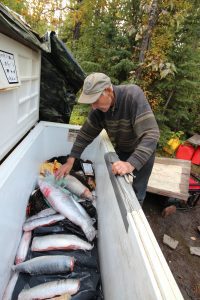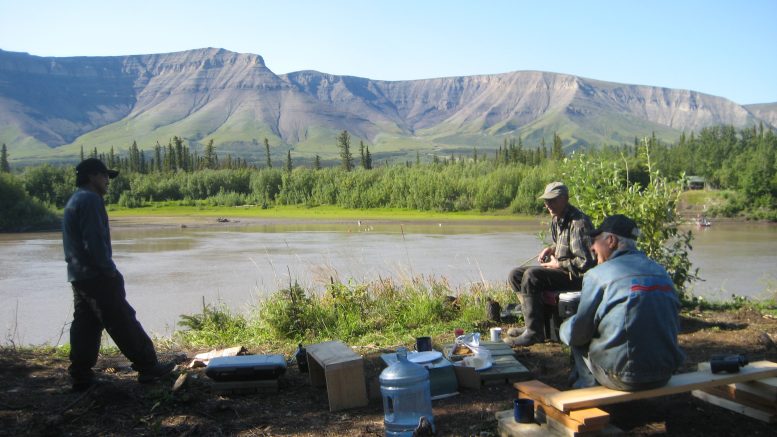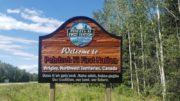Like father, like son, or so the saying goes.
Since John Carmichael’s recent retirement from the Gwich’in Renewable Resources Boards’ char monitoring program, his eldest son Harry Carmichael has taken over.
“He taught me everything I know,” says Harry Carmichael, John’ son, but “I’ll probably never have the fishing knowledge that he has.”
Harry says he has “mixed feelings” taking over for his father.
Just last year, Harry and his wife Florence began taking samples on Rat River at Johns Camp near Aklavik.
This comes after celebrating John Carmichael’s 25 years of service to the program.
The program allows residents along the char’s migratory route to collect data and make regular recordings, aimed at sustaining the char in the community.
Over the years, John has taken detailed notes on the trends of char fishing and trapping at his camp.
CKLB has reached out to John but his family says he’s currently in hospital.

John Carmichael sifting through frozen char.
(Photo courtesy of Amy Amos)
“He was born a trapper, I wasn’t,” says Fred Carmichael, John’s younger brother.
“You got to have a passion for it,” he adds.
Fred says Harry took right after his dad and fits the role well.
“Fulltime trapping is a thing of the past,” he says, these traditional skills are dying.
“He really contributed to the conversation,” says Amy Amos, executive director for the Gwich’in Renewable Resources Board.
“He knew the fish and he knew the land,” she adds.
The program aims at helping biologists understand the char better, says Amos, giving Elders and community members a chance to be a part of the conversation.
“I strongly believe that our Indigenous voices need to be at the table,” she adds.
Harry admits the role of char monitoring has been in the family for generations because of where his father’s camp is located on the river.
“There’s no place else for anybody to do the program,” Harry says, “so it stays in the family.”
Harry remembers going out on the land, trapping and fishing since he was nine years old.
It means a lot to take this project on, Harry says, “this was the place where we enjoyed ourselves the most.”
Harry plans on doing things just like his father before him, tracking water levels, char trends and environmental changes.
Following in his father’s footsteps, Harry feels a sense of responsibility to carry on what his father left behind.
Harry says he’s most interested in looking after the family camp and making some extra money on the side.
“I can’t see myself doing this for 25 years. . . I am willing to give it a try tho,” says Harry.
Once a year the char monitors come together with the Gwich’in Renewable Resources Board to discuss their findings.
This program is a collaborative effort between the Gwich’in Renewable Resources Board and the federal department of Fisheries and Oceans.
Mariah Caruso is a digital journalist, originally from Toronto, Canada. She graduated from the University of Toronto with a Hons. Bachelor of Arts and completed her Journalism post-grad at Sheridan College. She has an insatiable appetite for life, storytelling, connecting to the people, and getting to the heart of the issue.
On her spare time, you can find her at your local coffee shop writing songs, poetry and prose or at the gym out-lifting men.
If you have a story idea, feel free to send her an email at mariah.caruso@cklbradio.com or call 867-766-2552 Ext 108






